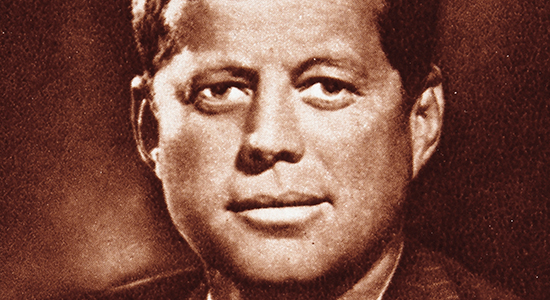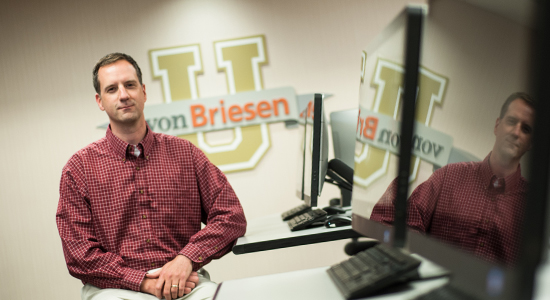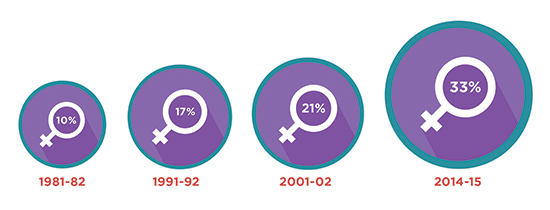From the Archives
Words of Wisdom

The State Bar of Wisconsin will get a new leader July 1 when Fran Deisinger takes over as the organization’s 61st president.
During his swearing-in speech on June 15, like other presidents before him, Deisinger will undoubtedly reiterate the legal profession’s important role in society and will address other topics important to lawyers in his President’s Message in Wisconsin Lawyer.
Following integration in 1956, the State Bar of Wisconsin’s first president, Robert Johns of La Crosse, had some wise words in 1957 when he said, “every lawyer needs an excuse for a holiday.” The excuse he provided, of course, was the State Bar’s Annual Convention, which was held at Lake Lawn Lodge in Lake Delevan that year.
If you can’t make the State Bar’s 2016 Annual Meeting and Conference, June 16-17 in Green Bay, find another excuse to take a holiday this summer.
On the Radar
New Supreme Court Rules Take Effect July 1

The Wisconsin Supreme Court adopted a number of rule changes that will take effect on July 1, most notably mandatory e-filing. Check out the feature article in this issue, “Are You Ready? Mandatory E-filing in Effect July 1,” for the details.
Lawyers should also be aware of the following rules or rule amendments that will take effect in July:
-
Amendments to rules relating to electronic banking for lawyer trust accounts;
-
Amendments to the Rules of Appellate Procedure, allowing circuit court clerks to transmit records electronically;
-
Amendments that give the Office of Lawyer Regulation discretion to investigate and prosecute de minimus ethics violations;
-
Creation of Wis. Stat. section 801.19 to protect certain sensitive information found in circuit court records and establishing procedures for submitting confidential information and sealing and redaction of documents.
For a more in-depth discussion about these changes, and other rule changes the court is considering, check out the June 1 issue of WisBar InsideTrack™.
Out There
Trekkies Oppose Copyright of Klingon Language

In 1984, an American linguist created the Klingon language, later spoken by fictional characters in Star Trek, a science-fiction film series that started with a TV series in 1966.
The Star Trek franchise, owned by Paramount Pictures, has produced numerous Star Trek films over three decades. Star Trek fans are often referred to as “Trekkies.”
Some Trekkies are angered that Paramount Pictures wants to copyright the Klingon language.
The Language Creation Society filed an amicus brief in Paramount’s copyright lawsuit against fan film producers that use the language and other Star Trek elements.
They say the language is not copyrightable because it’s now a living language spoken between real people in real life. “It would not take a Vulcan to explain their logic – even the Pakleds would know that nobody can ‘own’ a language,” the brief states.
Source: Inverse.com
Quotable
“Change is the law of life. And those who look only to the past or present are certain to miss the future.”

– John F. Kennedy, U.S. President (1961-63)
JFK’s words ring very true for the practice of law, which continues to undergo historic changes driven by technology, economics, regulatory issues, and client expectations.
In this column, you’ll see news about a “robot lawyer” named ROSS. In twenty years from now, you may hear about an “entity” named JUDY, which helps you literally keep working client files “in your dreams.”
Through its Wisconsin Legal Innovator Initiative, the State Bar of Wisconsin is showcasing legal innovation. Do you know a legal innovator? How about you?
Nominations are open until June 30. Learn more at thatsafineidea.com.
Good Ideas
Robot Lawyer ROSS Employed in WI

William Caraher, chief information officer at von Briesen & Roper in Milwaukee, recently confirmed that von Briesen is one of a handful of U.S. law firms employing ROSS Intelligence for legal research. ROSS is employed in the firm’s bankruptcy group, Caraher told The American Lawyer.
Built on IBM’s cognitive computer Watson – which made its national debut on the game show Jeopardy – ROSS “was designed to read and understand language, postulate hypotheses when asked questions, research, and then generate responses (along with references and citations) to back up its conclusions” according to Futurism.com. “ROSS also learns from experience, gaining speed and knowledge the more you interact with it.”
“Instead of reading carefully through every single case that might be relevant, lawyers could quickly get information from ROSS, leaving them free to spend more time analyzing complex details of the most relevant cases and laws,” wrote Angela Chen, a technology reporter at Gizmodo.
Caraher said ROSS augments the expertise of von Briesen’s lawyers and currently complements other research methods, but could replace some current research systems in the future. He said ROSS is not intended to replace attorneys, but to provide them with cutting-edge tools.
By the Numbers
Wisconsin Supreme Court oral arguments presented by women have climbed steadily in last 30+ years

Men predominate oral arguments in all cases, but women predominate in cases argued on behalf of government agencies and public interest groups, arguing 55 percent of those cases in 2014-15 (compared to 20 percent in 1981-82).
Women in private firms argued just 16 percent of cases in 2014-15 (3 percent in 1981-82).
Source: Marquette University Professor Alan Ball, SCOWstats.com
